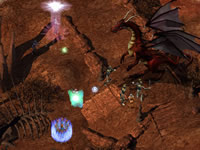| |
Site Navigation
Main
News
Forums
Games
Games Database
Top 100
Release List
Support Files
Features
Reviews
Previews
Interviews
Editorials
Diaries
Misc
Download
Gallery
Music
Screenshots
Videos
Miscellaneous
Staff Members
Privacy Statement
|
|
Welcome to E3 week. This means less sleep for us - and more info for you. Let's start with an Warhammer Online interview that has been posted at gamespy today. Warhammer Online recently found Sega Europe Ltd. as a publisher, and it seems to me that it is one of the more interesting MMORPGs in the making. General manager Robin Dews answered their questions, and we quote the (long) first one her (it's a very detailed interview, BTW) because it introduces you to the Warhammer Universe:
GameSpy: Give us an overview of the material that this game is based on and why it's so appealing to so many people in your opinion.
Robin Dews: In order to give you an overview of the Warhammer world, I need to go back to the origins of Games Workshop. The first version of Warhammer was published in 1983 when GW was a small UK based hobby company. As a set of tabletop fantasy game rules, with accompanying miniature ranges it set new standards of character, quality and detail, but even more important than the rules was the dark, gothic, medieval background within which all of the action was embedded. Now in its sixth edition, Warhammer has grown to become THE tabletop battle game that sets the standard worldwide. And so for almost twenty years now, Games Workshop has been writing, illustrating and creating miniatures based upon this fictional world to the extent that it has now become one of the best documented fantasy settings outside of Tolkien's Middle-earth.
Indeed over the years, Warhammer has of itself spawned a whole range of additional games and supplements. Warhammer Fantasy Role-play (WHFRP) became a best selling role-playing system that remains in print. Man O' War enabled players to take to the high seas and fight naval battles in the Warhammer world. Warhammer Quest was a classic 'dungeon bash' board game and the recently published Warmaster allowed players to fight tabletop battles on a sweeping epic scale.
And so far more than simply being a game, Warhammer and its science fiction cousin -- Warhammer 40,000 -- have grown to become widely known fantasy worlds that encompass tabletop wargaming, Black Library fiction, comics, role-playing games, computer games, collectable card games and art-books. Often copied and imitated, Warhammer and its imagery has now almost become part of the visual language of fantasy gaming. Its rich dark, gothic setting replete with monstrous creatures and underlying cosmology of Chaos sets the standard for dark fantasy and horror across the world.
Why is this world so appealing to people -- there's a $64,000 question!
Most fantasy games draw their inspiration and setting from Tolkien (obviously) but also from the same sources that he used as the inspiration for Middle-earth -- Anglo-Saxon and Norse mythology and poetry etc. In practice this means that they largely have what I'd call a 'Dark age' feel and of course Dark Age of Camelot makes no bones about their inspiration. Warhammer has always been rather different and it's why it has very distinctive character and feel in this landscape of rather 'generic' fantasy games. We call Warhammer a 'renaissance' rather than a 'dark age' world.
On a superficial level, this means that it has guns, swords and magic as its technological base rather than the traditional 'sword and sorcery' fantasy settings. The European Renaissance was an incredible burst of creative and intellectual energy that completely outstripped the ability of the society to support it. Thus while most of the populace were living in disease and squalor, Leonardo was creating ideas for flying machines, computers and tanks and the Inquisition were ready to burn Galileo for suggesting that the Earth revolved around the sun! We kind of like this period as it allows us great scope to play games of 'what if?'
Its this combination of fantastical technologies, with magic as a heretical and perilous sorcery and the merciless poverty of everyday life that gives the Warhammer world much of its character -- and makes it such a cool place to set games in!
As Rick Priestley the original author of Warhammer and now GW Creative Director recently commented: "Warhammer was always a cheerful melange of the serious and absurd. Our inspiration came from the obvious candidates of Tolkien, Robert E Howard (et al), and Michael Moorcock - solid fantasy fare for the time. Less obviously perhaps; Shakespeare, Milton and William Blake - truly no source is sacred! If the ingredients seem overly credible then the secret must be in the blending - the Radio show I'm Sorry I'll Read That Again, TV's Monty Python - and the Python films, the Carry On movies, and (as if I should forget) Clint Eastwood's spaghetti westerns."
I believe that the bottom line here is that this in not simply a fantasy background, game world and map that has been knocked up for the purposes of making a computer game. It's a living, evolving, historically-based world that has been developed over very long periods of time and across many different media.
And at the end of the day, if you are going to ask people to pay you money to participate in your world then you'd better have something good to offer -- I believe we do! |
|
|





 Warhammer Online Interview at Gamespy
Warhammer Online Interview at Gamespy